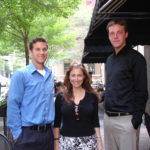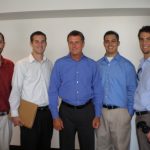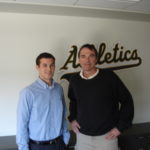He is a former Wall Street banker and the first deaf pilot to earn an instrument rating from the Federal Aviation Administration. We are at his kitchen table in a one bedroom apartment in Akron, Ohio. He has a big binder of press appearances, letters from people who heard him speak- an amazing life in lamination.
Interview: How to Become a Wall Street Trader
You were born without hearing, right?
That’s right. I was born deaf. It wasn’t until I was three years of age that they found out I was deaf. My mom didn’t know.
Do you have any brothers or sisters?
I do. I have one brother and two sisters. They all hear. I’m the only one. I was born a month premature. A month early. They didn’t know I had a hearing disability. It was my grandmother who found out. I was watching Bugs Bunny on a Saturday morning and my grandmother called my name out from behind me, and I didn’t turn around. So she called my mother into the room and they clapped several times and called out my name. I was focused on Bugs Bunny. I didn’t turn around, so they took me to the hospital. They had me evaluated and they found out that I was deaf.
I missed out when you were talking about the fifth grade story. I read it on your website but I was hoping that you could tell me a little about the fifth grade story.
When I was in elementary school I had a terrible time with math and reading. I was not doing well. At that time I wore a hearing aid that was strapped around my chest and ran up to my ears. I looked like I just stepped off a spaceship. At that time I had buck teeth, and my teeth were yellow. On the outside I was very happy lucky go, but on the inside I had very low self esteem. They almost held me back in fourth grade. But the powers that be passed me forward. I was put in Mrs. Jordan’s fifth grade class. Mrs. Jordan was a large woman with salt and pepper hair. Brown eyes and a smile that lit up the room. One day she had a question, and I don’t remember the question, but I remember knowing that I had the answer. I don’t remember my answer either, but I raised my hand hoping that she wouldn’t call on me. Have you ever been in that situation? Please don’t call on me. But she did. When she called on me, she did the most powerful thing. She said, ‘THAT’S RIGHT STEPHEN!’ So I sat a little taller in my chair. Every one was looking at me. I felt like a Chinese czar.
A week later I’m on the playground. It was a beautiful day. The sun was shining and I’m playing. This kid David was walking towards me. David was the bully. He beat up everyone in the whole school, except me. Not that I was tough, because remember, I was very thin, scrawny, buck teeth, and I wore those huge hearing aids. But there he was. I remember thinking, ‘My time has come.’ All the other kids knew that also. So what did they do? They surrounded me like they do at Madison Square Garden. But they left just enough opening for David to make his way through. Now David was the spitting image of the Fonz. He had jet black hair and he wore a t-shirt with a cigarette pack and the sleeves rolled up. He had a sneer like Elvis Presley. He was very cocky. There he was. He was making his way towards me. The minute he walked in that circle, it closed up. It was just me and David now. I didn’t know what he was going to do. But somehow I had this overwhelming feeling to do something. So I put my hand up like a traffic cop. That threw him off. I saw a flicker of fear in his eyes. I was the only one that saw it. It gave me just a little more courage. I said, ‘David. Do you see this hearing aid box?’ He cackled like the Wizard of Oz. I said, ‘David, if you punch this hearing aid box, it will blow up the whole school!’ He believed me. David’s face turned paper white. He took one step back, and then another, and then the circle opened up. He was gone. I watched David get smaller and smaller. I looked around, and everyone was clapping and patting me on the back. I became the most popular kid after that. Because my fifth grade teacher said three words. That’s right Stephen. It gave me more confidence than you would ever imagine. Today, the ripple effect keeps going. Because I’m still talking about it. I’m telling people that they can make a difference like her.
Thirty years later I surprised her on a talk show to thank her. You’ve heard of Leeza. One day I was in my apartment thinking about who I could thank. Because I’m the type of person to thank people. I’m very grateful for everything that’s happened. I wanted to thank somebody. Her face came into view. I saw her face, I saw her smile. I thought I would thank her. I wrote a letter to all the talk shows. I wrote a letter to Oprah, to Leeza, The View. I heard back from Leeza. They wanted me right away! There was one problem. They couldn’t convince her to go on a talk show because she was very dedicated to her fifth graders. Nothing would move her from that classroom. So her husband got involved. Her daughter got involved. Finally the principal got involved and they lied to her saying she was going to get some award. Finally she said she’d go, but she was taking her daughter with her.
They flew her out to Hollywood. They flew me out to Hollywood. When I got there, I found out she was in the same hotel as I was. She was one floor above me. I was hoping that she wouldn’t recognize me. I didn’t want to stay cooped up in my room, so what did I do? I put on a baseball cap, big dark sunglasses and a baseball jacket. I went out and I saw Hollywood. The next morning they put me in a limousine and took me to Paramount, where they were filming the show. Thirty minutes later they put her and her daughter in another limousine. I got there first. They put me on the show, and I told everyone what happened. And then Leeza said she’d hide me backstage. They put me backstage and they brought her out.
I’m back there and I’m watching everything on a closed circuit monitor. When she walked out, she looked exactly the same. Exactly. Her hair, everything. When she walked out, the camera that was following her was at an angle looking up at her. When she walked out, she probably thought she was going on the Jerry Springer Show. Because she looked nervous. She sat down. Leeza asked her if she knew why she was there. She said no. Leeza said it was a good thing. Someone wrote a letter, and they wanted to honor you. When Leeza said that, she started to cry. She tried to remember who it was.
They played a recording of my voice. While they were playing it, I said ‘Thank you for making a difference in my life.’ The camera panned up to her face and Leeza asked if she knew who that was. Yes. Who? Stephen Hopson. She said my first and last name. Leeza said that I was there to see her.
Now I’m a ham. I can be a ham sometimes. Some invisible technician told me to go out there. So I opened the door. And the doors were cheap. It was flimsy. When I opened the door, I opened it rather hard. I put my arms out, and she came into my arms. We hugged. That was the first time I had seen her in thirty-six years. I wanted to thank her for saying those three words. I told her so.
That’s pretty amazing that just three words have impacted your whole entire life. That was the center of that ripple and its expanded for the next thirty-six years.
I’m still talking about her today.
You hear about how confidence is a building process and you have to take one small step and take the next steps. Is that how it works?
Yes. Those three words were like a seed. She planted a seed in my mind. When she said those three words, I remember thinking that I was going to make something of myself. I didn’t know what, because I was only in fifth grade. But when she said those words, it lit a fire under me.
Since that point, you’ve accomplished so much in your life. You’ve, first of all, been able to communicate. That in itself is huge. I mean, not every person with a hearing disability could read lips and speak like you. What was the type of work ethic that you had to go through to be able to communicate like this?
You mentioned earlier that you had speech class before. You would go home and continue with your mother. How long did that really take?
It took me twenty years, probably. How my mother would do it is she would have a booklet with pictures and words underneath them. We would go through the booklet and she would point to the picture, and then point to the word. She would have me put my hand on her throat and she would say the word. I’d feel it. She’d put my hand back on my throat and I would repeat after her. I would continue to do it until I got it right. We did that forever. I credit my mother for helping me with that.
How important was that support from family to get to where you are today? Because you probably couldn’t this by yourself? How important was that support?
Very important. Incredibly important. It’s very important to have a support team. My mother believed in my ability to speak. She did not want me to learn sign language. She went in that direction. In fact, she put me in a public school rather than a deaf school. They had to make a choice whether to put me in the school for the deaf or public school.
How do you think that choice of going into the public schools has affected you?
Well, it was not easy because I was surrounded by people who could hear. I was often left out. But I had to learn how to adapt. But it worked well for me because I’m able to function in the larger world. 99% of the world can hear. My mom wanted me to be able to do that.
So you went to Marist College? Were you able to get a job after going to that school?
Right before I graduated they sent me to hundreds of companies. Nobody wanted anything to do with me except the Bank of New York. That was my first job. There was a guy there who liked me and wanted to give me a chance. He interviewed me and I got the job. But I sent my resume to hundreds of companies. Nothing.
I had a lucky break at that point. That’s what started my career on Wall Street.
When you started that first job, did you have an ultimate goal for yourself that you had set as far as the work world?
This may come as a shock to you, but even though my fifth grade teacher planted a seed in my head, I was going through a period of drifting. I was kind of like, lost at sea. I was in the middle of this huge ocean, kind of flailing because I didn’t know what I wanted to do with my life. I didn’t know where to go.
I knew I had a lot of capabilities. But I didn’t know what my purpose was. So I kind of worked my through.
When did you get the job on Wall Street?
The Bank of New York was on Wall Street. I quit that and went to work for Merrill Lynch. I was on Wall Street for 15 years. My first job was on Wall Street, and my last job was also on Wall Street.
So you mentioned earlier that you became a broker on Wall Street. You were you selling stocks, right?
Right. I was selling stocks, bonds, and mutual funds.
How hard was that because you see the movies of Wall Street and you always have those hectic scenes with every one everywhere. People are screaming into the phone all that time. What was that experience like for you?
It was fun. It was a challenge. But it was fun. I had a good time. And you’re right. The idea that you have in your mind about what that looked like is exactly how it looks. Everyone is on the phone. Everyone is running. But I did not work on the trading floor. I had my own office. My clients came to me. That kind of thing.
I did some phone calls through the phone service that I was telling you about. That was hard. But eventually I was able to get more clients through word of mouth and referrals. I did some seminars. I did things like that.
You mentioned that you would call these people and they would hang up on you.
Oh yeah.
It seems like your whole life, there’s been a lot of doors that have been shut on you.
Oh my God, yes.
What’s the word ‘no’ mean to you?
Like I said before, my fifth grade teacher, my mother, lit a fire under me. I can’t explain it to you. But there’s something in me that just won’t give up. It’s in my blood. There’s a chromosome in there that tells me not to give up. A dream, if you will. It’s inside me. When I set my mind on something, I’m the type of person that will stay focused. Sometimes when I do that I put everything on the side and stay focused until I get there.
I could probably learn how to balance my life a little more. But I’m very driven. I’m not quite sure why.
You don’t have to convince me. I’m sold.
I just don’t know what it is that drives me.
Do you think that gene that drives you is in everyone? Or do you think it’s in certain types of people?
I do. I think that little gene lies dormant in everyone. It’s a matter of lighting it.
How do you light that?
Through being at the right place at the right time with the right people. Having the right people in your life, having someone reach out to you. I talk about my fifth grade teacher so much because I want people to realize that it does matter if they reach out. It doesn’t have to be those three words. It can be a smile, or it can be like, ‘Hey! I like you. I think you can do this.’
I mean, imagine how powerful that would be.
If everyone could have that fire.
Wouldn’t that be great!? Wouldn’t that be cool. Just to have someone say, ‘You’re a good guy. You can do this.’ Sometimes, that’s all it takes.
We’ve mentioned a few of your accomplishments. Do you have one that you’re the most proud of? You graduated from college.
I am the first deaf instrument rated pilot. For the benefit of the viewers, an instrument rating is a rating that allows you to fly in bad weather. Which requires the use of radio. Which a deaf person cannot do. They gave me a waiver that allows me to fly with another qualified pilot to do this.
So my most proud accomplishment? I’ve had a few. I can only tell you one, right? You want me to tell you one, or you want me to tell you two?
List off a couple and let’s try to break it down.
My two most proud things was when I was able to make it as a stock broker. That would be one. And the other would be when I became the first deaf pilot to be instrument rated.
When did you officially make it in your mind as a stock broker? Was it day one when you walked in? Or was it that fourth year?
Before I answer that question, I do believe very strongly that people should set a goal of what they want and be specific about it. I don’t remember specifically saying that I was going to make ‘x’ amount of dollars, but I do remember saying I was going to win a sales contest at Merrill and I did. I won a trip to Bermuda. I won a trip to Mexico. And I won a trip to Florida. I was a rookie broker at the time.
But how I did that was I cut out a picture of the hotel that I would stay at. I put it by my wall. Every day I came in I said that I was going to win that trip, and I did. I think that because I was winning all these trips, and the money followed.

So you were the top guy at one point?
I wasn’t the top guy. I don’t want to say that. Let me just put it this way. I did very, very well. I was not the number one broker. No, no, no. I was not number two, five, ten, but I was doing very, very well. I was doing well enough. I was pulling down $300,000 a year at one point. So I was doing that well.
What allowed you to get to that point? Was it that picture of your desk? Was it that gene that was in you?
Everything. It was that gene. That photo. And the drive. I was hungry. I was hungry. I was really hungry. In a fun sort of way, I wanted to prove to my father, my friends, and to myself that I could make it. I also wanted to prove to those guys that interviewed me.
I had twelve interviews with Merrill Lynch. All twelve of those people said I wouldn’t make it. I guess I wanted to prove to them that I could. That was my motivation.
That’s interesting.
It’s hard to put a finger on it, but it’s in you. It’s that gene. It’s something.
It’s that hunger. Definitely.
So you were hungry to be on Wall Street and you made it. You were hungry to fly on planes, and you made it. What are you really hungry about now?
That’s a good question. I’m still hungry. I’m still hungry. And I still need to put food on the table. I’m more hungry now with different goals. I want to have my first book published. I’m hungry to speak around the world. I’ve done that, but I want to do more of it. I’m hungry to continue to make a difference in the form of speaking and writing.
It seems like the way that your mind is structured, the way you describe things when you’re telling stories, I’ll be the first in line to buy that book. It’s going to be a good one.
I’m excited. I do believe that I have big things coming my way. Just being patient, having faith that things will come. They have, but there’s more coming.
You talk a lot about adversity in your speeches and on your website. Maybe you could describe how important that is.
First of all, adversity does not discriminate. No one is immune from adversity. Some just have more than others. I’ve had it. I have come to see adversity as opportunity to grow and learn. An opportunity to get smarter. An opportunity to see things in a different way. Instead of thinking, ‘Why me?’
I used to do that. Believe me, I used to think, ‘Why me? I’m deaf. I don’t want to be deaf. Why? Why! Why!’ I used to think that. But now I’m like, ‘Why not?’ I now know that I have a special purpose. Every one has a special purpose. My purpose is probably, no not probably, my purpose is to show people that they can achieve their dreams. All it takes is a lot of perseverance. Adversity is my teacher. I learn things through adversity.
I was going to ask this question, and you mentioned it in your last answer, but that adversity, there has been times when it’s held you back. You said, ‘Why me?’ Was there ever a time that sticks out in your mind that you had that adversity and didn’t see it as an opportunity?
Absolutely. I’m human.
Is there one moment that comes to you?
Seven years ago I had an agent that represented me for a book. When that didn’t work out I thought to myself, ‘I’m not going to be an author now.’ I let that hold me back a little bit. Oh yes. Even now, sometimes, if I hit a wall, I’ll feel disappointed. But I learned something from the past, and that is, if I hit a wall, I get myself a support group. I surround myself with people who believe in me. I surround them to help me get over that. Because I can’t do it alone. We can’t do anything alone! Look at what you’re doing. You’re not doing this alone. This bus tour, you’re doing it with people. When you go in the dumps, these people lift you up. You wrote that on your blog. You wrote about how these guys who are with you are your friends and they lift you up. We need that.
That definitely is something. I guess the challenge is actually surrounding yourself with good people. That’s a challenge. Most people are unable to do that, thus, they stay stagnant a little bit. Right? Isn’t that the case?
It’s very easy to give up. It’s easy, easy, easy. It’s very hard not to give up. Because the other option is so easy. But I keep telling myself that if I give up, what then? I’ll never know what I could have done. I have that on my mind. If I give up, what could happen when I get older. I’ll be thinking that I could have done this. I don’t want that on my conscience.
Definitely. I don’t think anyone does. It’s easier in the moment, and in the future it’s not going to be so easy. That’s kind of what drives me too. A lot of the people I talk with are the same thing. I don’t want to be seventy-five years old sitting on the front porch thinking about what I could have done.
Right. I see adversity as an opportunity. Because you learn something. Even people who are not nice to you, maybe they come into your life and you learn something from it.
So if there was one piece of advice that you could tell yourself as you’re leaving college, what would be the one thing you would tell your 21, 22 year old soon to be graduate self?
Believe in yourself.
And you didn’t believe in yourself back then?
Well, I didn’t believe in myself at certain points along the journey. But there was the other side of me that did believe in myself because other wise I wouldn’t have done what I’ve done. My advice to people would be to believe in yourself. Don’t give up.
Another thing I wanted to touch on was fear. A lot of people are too scared to go out and follow what they believe in. Just the other day when we were at that prison we were talking about, and all these prisoners were talking about their fear of getting out of jail and going and finding a job. To them, that was the most frightening thing in the world was getting back on their own two feet. Because that’s an unknown for them! The unknown is what strikes fear in people. We connected that to someone in our position who just graduated school and has the world at their fingertips, but they’re too scared to go out and get it, because it’s an unknown. I was wondering what really scares you, or scared you along the whole journey? Was there any fear?
Lots of it. Lots and lots of fear. There was fear in not being able to pay the bills after I quit. Because I quit my career on Wall Street in 1998. I wanted to follow my dream of being a speaker. A couple weeks after I quit, I got scared. So I applied for all these jobs. But nobody would hire me. I then realized that I better keep going. But there was lots of fear.
But fear, I’ve come to realize, that fear is misdirected energy. That’s what fear is. It’s nothing more than misdirected energy. All you have to do is take that energy and channel it some other way. It took me a long time to figure that out though.
When I get scared, I feel it in my stomach. Right here. I look at my stomach and say, ‘Don’t worry. Everything will work out.’ Of course, I don’t do that in public. People would think I’m crazy. But when I have some time to myself, I reassure myself that everything is going to be alright.
You mentioned earlier about the power of positive thinking. You mentioned your story about your horrible boss Harry. Closing your eyes and just imagining him as something else or something positive. I was wondering if you could touch on the power of positive thinking in relation to how it’s helped you achieve your goals.
The power of positive thinking is an energy thing. It is nothing more than your internal attitude. Positive thinking is not thinking you’re going to be a doctor, and you think you’re going to be a doctor, but you don’t have any training. All the positive thinking in the world is not going to help you become a doctor. But, it’s a mindset. The more you think positive, and the more you think with a degree of optimism, the more your whole body, mind, spirit will move in that direction.
Positive thinking is very powerful. I used it with the power of visualization. I like to visualize. When you look at my refrigerator, I have a picture of Oprah. It’s my dream to be on her talk show. I also have a cut out of the New York Times best seller list. I put my name on top of it. It’s my dream to have a best selling book. And I have a picture of a plane that I would like to fly. It’s all on my refrigerator. I see it every single day. It keeps me going. That’s what helps. That positive thinking. It’s also a visualization. So I like to put the power of positive thinking, and the power of visualization and put them together.
I think that will work out for you.
It’s worked out so far. That’s my next stop.






